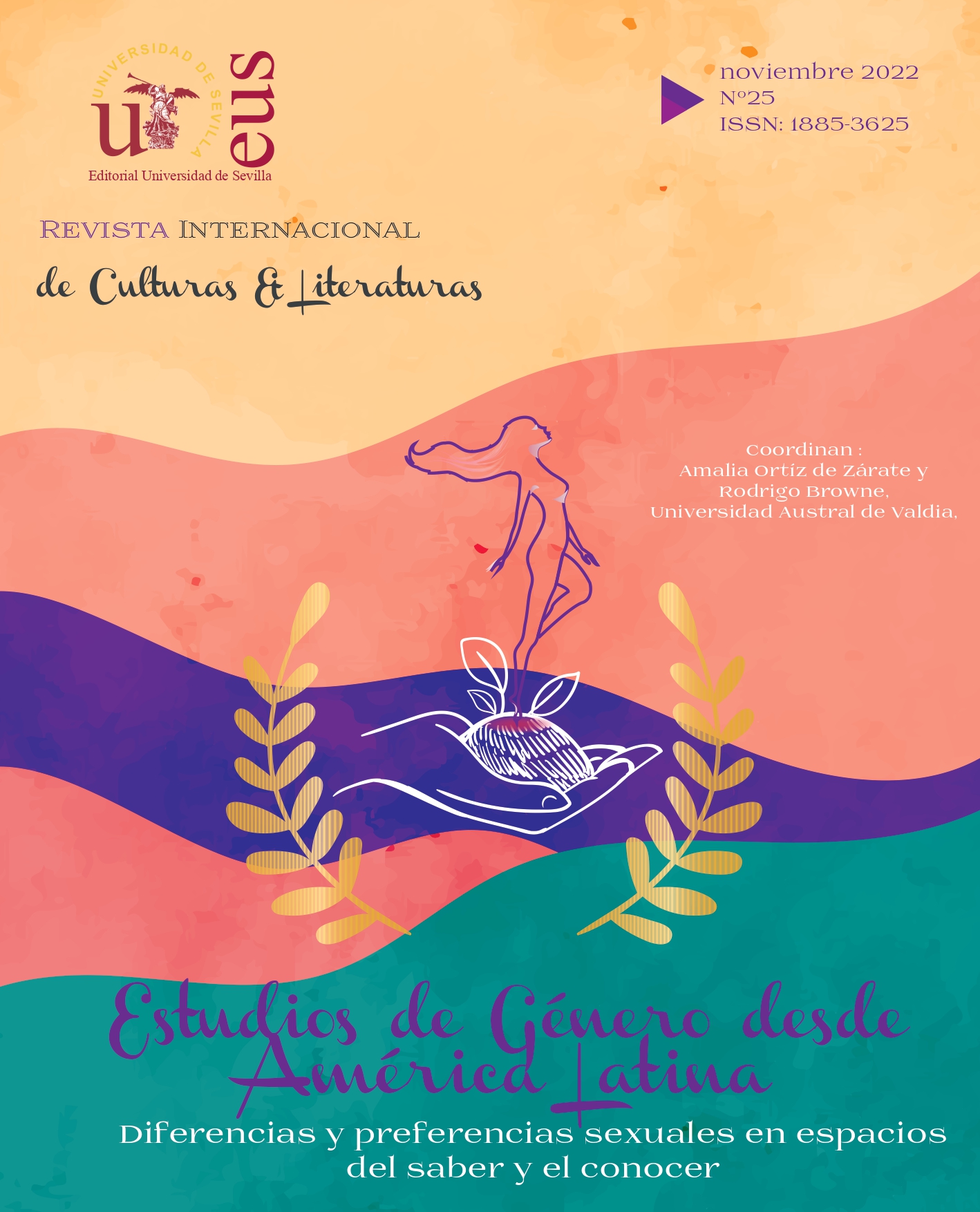Español
DOI:
https://doi.org/10.12795/RICL2022.i25.12Keywords:
crueldad, violencia, sociedad neoliberal, fragmentaciónAbstract
H.P. (Hans Pozo) by Luis Barrales is a dramatic text, premiered in 2007 by the Theater Company La Nacional under the direction of Isidora Stevenson: a man is found dismembered in the city of Santiago de Chile in the year 2006. The dramatist rewrites history, identifying and proposing some significant fragments of the prevailing cultural system, as it is visualized in Chilean drama at the end of the 20th century and the beginning of the 21st century. These fragmented dramas leave spaces, voids that the reader/spectator is called to complete from their own experience. Enhancing, for this purpose, the role of the author/architect, the one who deconstructs, organizes, and assembles an open, discontinued, proposal that leaves “holes” through which the constructions of meaning could sneak in (Hurtado), and the reader/spectator is confronted with a cruel and violent spectacle that accounts for a reality of a society controlled by dominating social groups. Barrales hands over an interpretive key to access the text, for the businessman uses the power he holds by appropriating a body, transforming it into his object of desire, evidencing a link of domination between the market and the corporeal.
The aim of this research is to analyze the dramatic text of H.P. (Hans Pozo) from the drama’s textuality according to the following categories: heteronormative society, repressed human behavior, homosexuality, and cruel images. The theoretical-critical discussions of Brossi, Foucault, and Spargo are fundamental in this case to approach the field of gender, sexuality, and masculinities, like Antonin Artaud, to stage cruelty in an investigative manner as a violence device. Barrales’ work forges a bridge with Artaud by introducing us to human beings, social, political, and cultural conflicts that travel through our history and inhabit our territory. Violence and cruelty act as a writing tradition, but they also create a viewpoint to observe our time and its vulnerating practices.
Downloads
References
Anónimo. Captura y fusilamiento de Dubois. En Antología: un siglo de dramaturgia chilena 1910 – 2010. Comisión Bicentenario. 512 -528, 2010.
Artaud, Antonin. 2003. El teatro y su doble. México: Grupo Editorial Tomo.
Barrales, Luis. 2008. “H.P. (Hans Pozo)”. 49 – 88. En Antología de Teatro Chileno Contemporáneo. La Habana: Fondo Editorial Casa de las Américas
_____________. 2008. “HP (Hans Pozo) El marginal que llevamos dentro”. 54-62. En Apuntes Nº130.
Batlle i Jordà, Carles. 2007. “La segmentación del texto dramático”. 68 -86. En Revista Apuntes 129.
__________________. 2005. “Notes sobre la fragmentació en el drama contemporani (i)”. Barcelona: L´obrador de la Sala Beckett.
Brecht, Bertolt. 1970. Escritos sobre teatro. Selección y traducción de Jorge Hacker. Buenos Aires: Ediciones Nueva Visión S.A.I.C.
Brossi, Lionel. 2010. “(Des) generando identidades. Intersexualidades y la inteligibilidad de lo humano.” Sociedad y Equidad. En www.sye.uchile.cl
Chomsky, Noam. 1999. El beneficio es lo que cuenta. Neoliberalismo y orden global. Barcelona: Crítica.
Connell, Robert. 1997. “La organización social de la masculinidad.” En Masculinidades. Poder y crisis. En Valdés, T. y Olavarría, J. eds. Santiago: Isis-FLACSO.
Cortés, Francisco. 2007. Justicia y exclusión. Bogotá: Siglo del Hombre Editores.
Cuevas, Agustín. 2009. El desarrollo del capitalismo en América Latina: ensayo de interpretación. México: Siglo XXI.
D´Amico, Silvio. 1961. Historia del teatro dramático. Tomo I. México: UTEHA.
Eco, Umberto. 1999. La estructura ausente. Introducción a la semiótica. Barcelona: Lumen.
Escobar, Benito.2001. Pedazos rotos de algo. En 7 Muestras. 7 obras. Teatro chileno actual. Santiago de Chile: LOM Ediciones.
_____________.2003. Baile de Rigor. En Cruce de Arterias. Dramaturgia (1997 – 2001). Santiago de Chile: J.C. Sáez Editor.
Foucault, Michel. 2005. Historia de la sexualidad 1. La voluntad de saber. Buenos Aires: Siglo XXI.
______________. 2000. Los anormales: curso en el collége de France (1974 - 1975). México: Fondo de Cultura Económica.
Gil, Eva. 2002. “¿Por qué le llaman género cuando quieren decir sexo?: Una aproximación a la teoría de la perfomatividad de Judith Butler.” 1 -12. En Athenea Digital (2) otoño.
Griffero, Ramón. 2011. La dramaturgia del espacio. Santiago de Chile: Ediciones Frontera Sur.
______________. 2008. “Poética del texto en H.P. de Luis Barrales. H de hastío / me aburro me canso…P por placer/ el lanza gemidos”.63 – 66. En Revista Apuntes 130.
Hirigoyen, Marie – France. 1998. El acoso moral. El maltrato psicológico en la vida cotidiana. Buenos Aires: Paidós.
Hurtado, María de la Luz. 2010. “Prólogo”. 1 – 37. En Antología: Un siglo de Dramaturgia Chilena Tomo IV 1990 – 2010. Santiago de Chile: Comisión Bicentenario.
_____________________. 2009. “Prólogo”. 9 -32. En Antología Dramaturgia chilena del 2000: nuevas escrituras. Santiago de Chile: Editorial Cuarto Propio.
Lavandier, Ives. 1997. La dramaturge. La Flèche : Le Clown et l’Enfant.
Lehmann, Hans –Thies. 2006. Postdramatic Theatre. New York: Routledge.
López Montaner, Ana. 2010. “HP/NOSOTROS”. 263-267. En Antología: Un siglo de Dramaturgia Chilena Tomo IV 1990-2010. Santiago de Chile: Comisión Bicentenario.
Matamala, Roberto. 2013. El discurso dramático. Valdivia: Ediciones Kultrún
_______________. “Pedazos rotos de algo: La compleja enunciación en el drama de Escobar” https://www.teatrolapuerta.cl/cms/wp-content/uploads/2020/07/Pedazos-rotos-de-algo_-La-compleja-enunciación-en-el-drama-de-Escobar-por-Roberto-Matamala-Elorz.pdf Consultado el 15 de Septiembre 2022
Parodi, Giannina. 2006. “Del diario a la escena: Análisis del traspaso del discurso periodístico a la escena teatral con el caso de Hans Pozo.” Universidad de Concepción.
Pavis, Patrice. 1980. Diccionario del Teatro. Dramaturgia, estética, semiología. Barcelona: Ediciones Paidós.
Pellegrini, Silvia. 1989. Políticas de información. Santiago: PUC.
Rabanal, Damaso. 2019. “Gritos culturales de legitimación: teatro y crónica de fin de siglo frente a la sociedad chilena” 51 – 65. En Taller de Letras N°65
Salazar, Gabriel y Pinto Julio. 2002. Historia contemporánea de Chile III. La economía: mercados, empresarios y trabajadores. Santiago de Chile: LOM.
Sartre, Jean Paul. 1967. San Genet, comediante y mártir. Buenos Aires: Losada.
Spargo, Tamsin. 2004. Michel Foucault y la teoría queer. Barcelona: Gedisa Editorial.
Van Dijk, Teun. 1990. La noticia como discurso. Comprensión, estructura y producción de la información. Barcelona: Ediciones Paidós.

